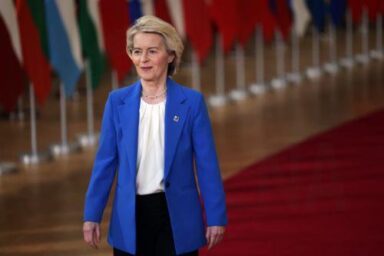The European Council has approved bolstering the bloc’s research and innovation ecosystem, endorsing a €16.3bn allocation for Horizon Europe’s 2028-34 cycle. The move aims to mitigate tensions surrounding dual-use technology, and to strike a balance between fundamental research and startup support.
The Council has approved conclusions on the importance of research and innovation for the EU Startup and Scaleup Strategy. These conclusions, sealed on 30 September, 2025, provide “guidance for the establishment of a strong and dynamic ecosystem where higher education and research institutions can support the creation and growth of new companies, valorise the results of their research, and attract and retain talent“, the press release reads.
This was not without controversy. One of the visible sticking points was a push to expand dual-use research, or projects with civilian and military applications, hitherto a no-go zone. During a press conference following the ministerial meeting, Danish Minister for Higher Education and Science Christina Egelund framed this as a geopolitical necessity: “When you sit in a shelter in Kyiv, you ask yourself: can we afford not to allow European research programmes to serve defence?”
A ‘fake contradiction‘
Ms Egelund, fresh from a visit to Ukraine, argued synergies between civil and defence research “support peace”. The Council’s conclusions tacitly backed this shift, urging “rethinking” of Europe’s approach without compromising its peace-promotion mandate.
A sharp divide emerged over balancing support for small firms and blue-sky research. Universities had warned that Horizon Europe’s funds risked skewing toward market-driven projects, leaving fundamental science underfunded.
You might be interested
EU startup and research commissioner Ekaterina Zaharieva dismissed such fears. “The Commission’s proposal doubles money for the European Research Council—universities are big winners,” she said. She noted tripled budgets for applied innovation, stressing simplified rules to “increase cooperation” between academia and industry.
Ms Egelund acknowledged concerns but rejected the notion of a trade-off: “There’s no contradiction. European competitiveness starts with fundamental research.” Citing the Draghi and Letta warnings about Europe’s sluggish tech transfer, she conceded “a lot to be done” on commercialisation.
Both leaders united in dismissing zero-sum narratives. “It’s a fake contradiction,” Ms Egelund concluded, invoking a Danish proverb to underscore interconnectedness: “A river needs both banks to flow.”
Startup strategy takes off
The Council’s conclusions greenlit the EU Startup and Scaleup Strategy, first tabled in May 2025, to anchor tech firms within Europe. The plan seeks clearer definitions for startups, scaleups, and “undertakings in difficulty” to streamline funding and regulation. Member states backed measures to cut red tape, enhance transnational access to research infrastructures, and leverage programmes like Erasmus+ and the European Research Council to retain talent.
Geographical distribution of funds—a flashpoint in Competitiveness Fund talks—loomed quietly. Ms Egelund acknowledged “understandable wishes” for equitable access but expressed confidence in balancing priorities.
When you sit in a shelter in Kyiv, you ask yourself: can we afford not to allow European research programmes to serve defence? — Christina Egelund, Denmark‘s minister for higher education and science
Ms Zaharieva reported “legitimate concerns” over infrastructure governance but noted “clear support” for bolstering EU-wide research hubs. Norway and other EEA countries raised alarms about potential exclusion from dual-use programmes, though discussions were deferred.
Strategy to implementation
The Commission now faces pressure to operationalise the strategy swiftly. Key tasks include drafting legal definitions, refining state-aid rules for academia, and launching the ‘Charter of Access’ to ease corporate use of research infrastructures. The Council emphasised “predictable funding” and KPIs to track progress, urging “maximum efforts” to reduce reporting burdens.
Europe has the talent, ideas, and ambition. — Ekaterina Zaharieva, EU Commissioner for startups and research
Historically, the strategy builds on the ‘Choose Europe’ talent initiative and past calls to address Europe’s “scaleup gap”. Only seven per cent of its tech startups reach €100m valuations, compared with 30 per cent in America. While the May 2025 proposal won broad political backing, debates over dual-use and research priorities suggest rocky negotiations ahead.
Ms Zaharieva struck an optimistic note: “Europe has the talent, ideas, and ambition.” Yet as Ms Egelund’s Kyiv reference underscored, ambition now carries geopolitical stakes. With innovation framed as both an economic and security imperative, the EU’s ability to marry labs with markets—and civilian with defence goals—will define its competitive future.










